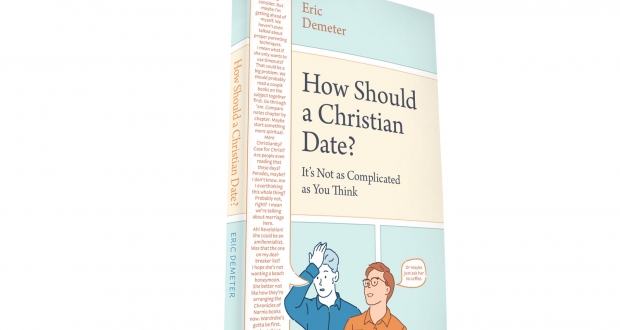There is No Trying-Out Marriage (That’s What Dating is for)
Remember the adorable, green, character from Star Wars named Yoda? While training the protagonist, Luke, in the force, he commanded him, “Do or do not. There is no try.” Although Star Wars has roots outside of Christian spirituality, the truth lies in this statement. Today, I’m thinking of how it relates to Christian marriage.
In marriage, there is no try. Admissions like “Let’s give this a shot” or “Why don’t we give it a go and see what happens?” cease to exist. Those half-hearted admissions create a recipe for failure. James, the brother of Jesus stated it like this;
It’s imperative that you make up your mind before exchanging vows and signing a marriage license that you are ready to stay planted for a lifetime. In dating, you try a relationship—that’s the whole point. When you officially find a girlfriend or a boyfriend, you hope it goes to marriage. But there’s still the process of figuring out if you want to spend the rest of your life with this person. The covenant you make is indissoluble in only the most extreme cases. Otherwise, whether you or them become sick, poor, undesirable, or stodgy, ending it is out of the question.
If there are problems in dating, you can bet the farm these same issues will rear their head in marriage. Marriage doesn’t ameliorate relational problems; instead, it magnifies them. Why? Because you are stuck with your problems. There’s no escape hatch. There’s no Plan B. But that’s a good thing. Because you’ve already made the decision to stick with this person no matter what.
Therein lies the beauty of marriage. You are essentially forced to work things out. I’m not saying stay with someone who is abusing you. My push is to work out the problems in marriage and relationships that aren’t part of anyone needing a restraining order. Marriage is the safest place to work things out because you know the person is committed to you, and you to them.
But you’re never “forced,” per se—you get to. That’s what you signed up for—to become “one.” And that takes a lifetime. Until then, you get to sharpen, chisel, and sometimes mold each other into being more Christ.
Of course, you can always bolt. But your issues will be tied to you like your shadow. It’s not surprising that second and third marriages have much higher divorce rates than the first. Divorce also has the added carnage of damaging children. I’m a child of divorced parents—and let me tell you—living with a single parent wasn’t a day of respite on Endor.
Commitment to a marriage keeps you there when dark, thunderous clouds begin to roll in. My mentor taught me that there are two types of commitment: The first kind is the one you make when you want to. In dating and even at the altar, your feelings and sexual attraction will probably be skyrocketing (especially if you’ve waited to have sex, and I hope you did). At that point, when you’re holding hands and looking into the depth of each other’s souls exchanging vows, you’ll want to say what you’re saying—you want to commit. You’re making a covenant promise to that man or woman out of volition.
The second is the type that keeps you there when you want to cut and run. It’s a binding commitment. Whether your feelings tell you to stay or not, you’re bonded to them. Look at marriage this way: The commitment that you made when you wanted to is the one that keeps you there when the feces hits the fan. But now, instead of just words swapped on the wedding day, you have the opportunity to put your commitment to good use. Is commitment really commitment if you never have to really choose it? If it’s never tested?
I’m not a marriage expert; in fact, I’m unmarried. But I know what I’m signing up for when I tie the knot. And that’s permanency.
Here’s the good news, as presented by pastor and author Timothy Keller:
Most striking of all, longitudinal studies demonstrate that two-thirds of those unhappy marriages out there will become happy within five years if people stay married and do not get divorced. This led University of Chicago sociologist Linda J. Waite to say, “the benefits of divorce have been oversold.[i]”
One couple I know had a horrible time when they first got married. But they stuck it out. Now they have a beautiful relationship. In another case closer to home, my grandparents were married for seventy-one years before my grandfather passed away. They know the power of staying put.
This should motivate all the unmarred men and women out there to take your time in dating. Dating is the time for trial and error, not marriage. Whoever you find yourself on the altar with, they become “The One”. If you need to date more to make sure you’ve found someone you want to spend the rest of your life with, do it. My advice is to not willy-nilly throw your heart around but to prayerfully consider who to open up to.
When you do, get rid of try. Your commitment will help you to say, “I will stay. We will get through this. “We will work it out.”
Yoda would approve.
Endnotes
[i] Keller, Timothy; Keller, Kathy. The Meaning of Marriage (p. vi). Penguin Publishing Group. Kindle Edition.
Linda Waite, et al., Does Divorce Make People Happy? Findings from a Study of Unhappy Marriages (American Values Institute, 2002). See www.americanvalues.org/UnhappyMarriages.pdf.
“The study found that on average unhappily married adults who divorced were no happier than unhappily married adults who stayed married when rated on any of the 12 separate measures of psychological well-being. Divorce did not typically reduce symptoms of depression, raise self-esteem, or increase a sense of mastery. This was even true after controlling for race, age, gender and income. . . . [R]esults like these suggest the benefits of divorce have been oversold,” says Linda J. Waite. From the press release for Does Divorce Make People Happy?, which can be found at www.americanvalues.org/html/r-unhappy_ii.html.












Leave a Reply